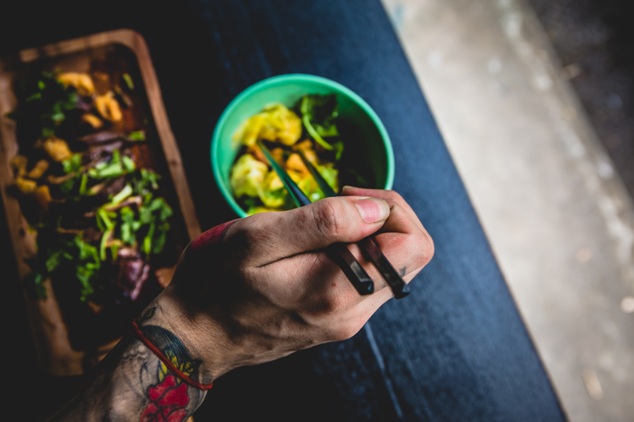
“Ana, please, let me sleep.
Perhaps it was me who summoned you,
And I didn’t file for a restraining order;
Yes, I proudly walked the line for you,
But I’d like to try and live on my own terms now.
My flesh, my blood, my bones are tired,
Ana, please, let me sleep.”
.
Once upon a time, I used to be an omnivore. Then something happened, and I was an omnivore no more.
If I was after bonus drama points, I’d say it was an eye-opening, spur-of-the-moment kind of change, but it wasn’t really.
It was more of a change that had been building up inside me for years—together with a fine medley of eating disorders that would’ve sent shivers down a nutritionist’s spine.
It all started when I was little: I distinctly recall looking at my pictures back in kindergarten thinking I should lose a few pounds. It grew from there: I started dieting at age 12, but to little or no visible effect. I tried everything: Atkins, skipping meals, quitting meat, sugar and fat, drinking irrationally high amounts of water, exercising to the point of utter exertion.
Nevertheless, all the hard work was of little use because I couldn’t shake my cravings. Food binges combined with fasting days soon evolved into overeating followed by forced vomiting. I didn’t know I was bulimic; even if I had, I don’t think it would have mattered. In fact, the only thing that did matter was losing another pound.
At university, I stopped even feeling hunger. Meals followed by intense workouts became a normal routine, but the scale kept adamantly refusing to budge below 100 pounds. At some point, I lost my period, but I didn’t take it as a sign that something was wrong with my body: I actually relished it, because it meant no monthly cramps. I counted calories by default, and I stopped eating in the company of others: meals with family and friends weren’t a normal everyday ritual; they were a sign of weakness and a source of shame. Food was the enemy, and I didn’t want to make peace with it—until the next binge, which was inevitably followed by self-induced vomiting.
Along with the aggravating eating disorder, anger and humiliation were building up. Despite my best efforts, I was powerless against the judgmental scale. I realized that fad diets were useless, and it angered me even more. It seemed that even nutritionists were in on the diet ploy: the world seemed dead-set against my weight loss, and I felt helpless, outraged and embarrassed. Browsing YouTube, I stumbled across a dietary system called veganism. Because of my previous dieting failures, I was extremely suspicious. “What if this is just another fad diet that will result in yet another round of hope, enthusiasm and disappointment?”
Just to play it safe, I tried googling the negative aspects of veganism. Having had my hopes crushed so many times by eating regimes advertised as fail-safe, I wanted to arm myself with all the info on potential adverse effects. Surprisingly, I found none: every person blogging or posting videos about their vegan experiences was lean and youthful-looking, and even scientific papers I came across accentuated the health gains of a plant-based diet: the high nutrient density of plant foods, benefits for the mood and cognition, weight loss and prevention of a host of chronic conditions.
The only red flag I saw somewhere in there was a hesitant warning that the vegan diet may not be sustainable in the long run unless planned and followed properly, as too restrictive a vegan regime could trigger excess weight loss—which for me wasn’t a downside at all. There was also a side note about cravings—but hey, I’d been living with those for years.
I considered it all for a few days, and then decided to give veganism a go. After all, I had nothing to lose, except that stubborn extra weight.
Going vegan wasn’t easy—but I guess it was far easier for me as an anorexic than it normally is for an omnivore with a healthy appetite. In the first few weeks, I’d catch myself craving yogurt and egg whites (those were the only two non-vegan ingredients I usually ate, as they had few calories). The most difficult part of my transition to veganism was the struggle to strike a balance between the amount of food I was supposed to eat and the scope of meals that didn’t leave me doubled over with stomach cramps. Vegan meal guidelines sounded terrifying at first: “How on earth can I eat all that without putting on weight instead of losing it?!” Still, I didn’t want to give up—in fact, I started looking forward to meals because I had a tacit permission to eat all I could, as long as it didn’t involve meat, dairy and eggs.
I put on a few pounds (blame it on my newly discovered passion for homemade vegan bread and pastry), and seeing my weight on the scale triggered a new bout of bulimia. This time, however, I had fewer and less intense cravings, and cycles of overeating and vomiting were less frequent. Looking back, I think that the shift to the herbivorous regime was a milestone that marked the beginning of my recovery.
A few months into the new diet, I realized I was less obsessed with calories, and my mood and focus improved. I no longer spent hours calculating the amount of workout time needed to burn off a meal. I also noticed that I’d begun to cook for myself: I had cooked for others before I turned vegan, but I never ate the food for fear of weight gain. This time, I cooked and relished every bite: quinoa dishes were delicious, and so were fresh salads—and they kept me full for hours. I slowly began to experiment with different plants and beverages. I fell in love with Asahi beer and kombucha at first gulp, and I discovered the exploding flavors of saffron, anise, cumin and nutmeg, which encouraged me to embark on an in-depth research of rare spices. My herb stock grew gradually, and my menu expanded as the months went by.
I’ve been a vegan for two years now, and the transition has brought me more good than I could’ve ever imagined.
I’m no longer a half-starved girl with food guilt, shying away from social events that involve snacks and drinks. My complexion has cleared up, and my energy is stable for the first time in my life. I enjoy falafel, dates, olives, seitan, tofu, and vegan burgers, and I keep a strict meal agenda, which was never the case before. I’m no longer ashamed of my body or afraid of intimacy—I can finally say that I love my life just the way it is, and I wouldn’t change it no matter what.
I think that the biggest gains veganism has brought me were self-acceptance and freedom. I could drop the herbivorous plate if I found it unsavory, and there were no warnings stamped in bold, capital letters as to what I must and mustn’t do. I had the liberty to change my mind and revert to eating meat and dairy at any point; I could still eat sweets, even chocolate, if I really couldn’t shake the yen; cravings weren’t labeled as unacceptable, they were seen as a normal side effect of the transition. Veganism seemed to go easier on my dietary discipline than any other regime I had tried before, and it was a blessing of a kind. Being allowed to fall short of the mark and not be judged was a new idea to me: I’d been punishing myself for eating bad foods by self-induced vomiting for years, but it was only when I turned vegan that I realized that.
One in five women on the planet will fall prey to eating disorders at some point in her life; many of them won’t make it out alive. Anorexia is currently the third most common chronic illness among adolescents, and anorexic girls stand a 12-times higher risk of health complications and premature death than their healthy peers. Between 5 and 10 percent of all anorexics die within 10 years of the disorder onset; 18-20 percent die within 20 years; only 46 percent of anorexia survivors fully recover. I’m one of them. My cure was veganism—it literally saved my life. I hope that my story will help girls and women struggling with eating disorders find the courage to speak up and muster the strength to fight the pale ghost of anorexia and bulimia nervosa.
You’re beautiful just the way you are, and you deserve happiness, health and love regardless of your weight, shape and waistline circumference. Don’t listen to the wicked voice inside telling you you’re not good enough: you are every shade of perfect, and you’ve been blessed with the miracle of life because you have what it takes to live it. It’s up to you to make the choice and live your life to the fullest.
Don’t give up just yet—trust me, you’ve got so much to lose.
Author: Chloe Taylor
Image: Lily Lvnatikk/Unsplash
Editors: Emily Bartran; Yoli Ramazzina











Read 0 comments and reply